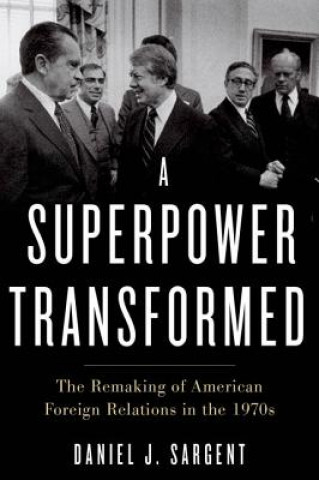
Livrare
Consilier de cumpărături





Nu se pretează? Nu contează! La noi puteți returna bunurile în 30 de zile
 Voucher cadou
orice valoare
Voucher cadou
orice valoare
Cu un voucher cadou nu veți da greș. În schimbul voucherului, destinatarul își poate alege orice din oferta noastră.
Superpower Transformed
 engleză
engleză
 112 b
112 b
30 de zile pentru retur bunuri
Ar putea de asemenea, să te intereseze


A Superpower Transformed explores the predicament of American foreign policy in the 1970s. This was a phase when the dilemmas of an emerging post-Cold War era buffeted the United States even as the makers of American foreign policy struggled for stability in an enduring Cold War. Clashing imperatives made the 1970s a difficult phase. Amidst conflicting pressures, leaders struggled to devise strategic frameworks to guide the exercise of American power in the world. 1970s-era choices nonetheless proved consequential. The Nixon administration's efforts to stabilize a faltering Pax Americana faltered, but Nixon's choices ultimately helped the champions of human rights to wrest control of American foreign policy away from the practitioners of amoral realpolitik. So too did Nixon's efforts to reverse the decline of American economic power help to open the doors to financial globalization, which accelerated quickly in the years following the 1971-73 collapse of the Bretton Woods international monetary system. Choices proved consequential, but American decision makers remained the captives of unmasterable circumstances, as the oil crisis of 1973-74 made clear. Coinciding with Watergate, the oil crisis plunged the world economy into disarray. It also pushed American decision makers to begin to devise new strategies to manage-or mitigate-the consequences of economic globalization. Henry Kissinger, who led this effort, was less successful in his attempts to terms with a human rights movement that flourished in the mid-1970s. Not until the inauguration of the Carter administration would American decision makers embrace human rights promotion as a central task for foreign policy. Carter's efforts to devise a post-Cold War foreign policy nonetheless faltered, confounded in the last years of 1970s by the resurgence of Soviet-American hostilities. While the Cold War resurged, the new forces of globalization and human rights that mobilized in the 1970s left the United States a superpower transformed.
Informații despre carte
 engleză
engleză




 Cum să cumpăr
Cum să cumpăr





















